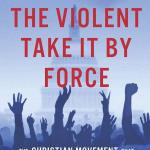Left Behind, pp. 326-328
Buck Williams and Steve Plank have been watching the Two Witnesses of Revelation 11 on CNN. They don’t wear sackcloth and they don’t shoot fire out of their mouths, but two guys who tried to kill them tripped, fell over and died, then one of them claimed to be the Messiah before they both settled back into chanting that Jesus was the Messiah. CNN’s Dan Bennett, bored already with the chanting, signs off, promising to record anything else that happens and to report on it after the fact.
Marge and a few others on the staff had drifted into Steve’s office during the telecast. “If that doesn’t beat all,” one said. “What a couple of kooks.”
If you ever met someone, in real life, who talked like the characters in Left Behind, it would become a story you told for the rest of your life. “No, for real,” you would say to your friends, who had heard this story a dozen times, but still enjoyed it while half-doubting that it really could have happened. “It was six years ago, at the airport, and the guy actually said, ‘If that doesn’t beat all, what a couple of kooks,’ just like that. And then he said something about ‘coming on like gangbusters.’ …”
Buck decides to stick up for the kooks:
“… What a couple of kooks.”
“Which two?” Buck said. “You can’t say the preachers, whoever they are, didn’t warn ’em.”
Actually, you can say they didn’t “warn ’em” because they didn’t warn ’em. Instead, they started out with a lethal little object lesson — kill the first two and the others will get the idea. It was only after killing those two that they informed the rest of the crowd that this is what would happen to anyone who tried to harm them. That’s a rather vivid warning, but it came a little late for those first two dead guys.
The authors have gotten confused here. They have read Revelation 11:5, which says of the witnesses that “anyone who wants to harm them must die.” That warning seems to be what they have in mind when they have Buck weirdly assert that the preachers “warned” their attackers that they would be devoured by flame and/or trip and die. But the authors seem to forget that Buck and Dan Bennett and, most importantly, the two trip-and-die guys, have not read Revelation 11:5 and thus were not privy to this warning. Here, again, was Bennett’s play-by-play description of the video Buck has just seen:
“The one wielding the knife surges forward first, displaying his weapon to Moishe, who had been speaking. Eli, behind him, immediately falls to his knees, his face toward the sky. Moishe stops speaking and merely looks at the man, who appears to trip.
Moishe “merely looks at the man.” Does that sound like a “warning” to you? No? Then what on earth is Buck talking about?
Here’s my theory. Despite never having read the passage himself, Buck is suddenly aware that Rev. 11:5 says that anyone who tries to harm the witnesses will die. Buck realizes that the only way he could know this is because he, as a character, has been granted full access to the thoughts and knowledge of the omniscient narrators. If that’s true for him, he has to assume it’s also true for all the other characters in the book, including the trip-and-die guys. Therefore, Buck says, “You can’t say the preachers … didn’t warn ’em.” And then, turning to Steve, Buck added, “Remind Jerry that Tim’s secretary needs all of his travel receipts by the end of the week.” (Not really, obviously, but it wouldn’t be any more absurd than what he just said.)
Or maybe the authors are just bad writers who forgot what the previous page said. But my theory does fit in well with LaHaye & Jenkins’ theology. They think of themselves as characters in some grand divine novel, watching God’s preordained plotline unfold before them. And like Buck in my theory, they believe that they have access to the secret thoughts of the author. (Still, bad writing is probably the likelier explanation here.)
“What’s going on over there,” someone else asked.
“All I know,” Buck said, “is that things happen there that no one can explain.”
Two weeks ago, Buck’s co-workers would have been impressed by that comment. A year before, you’ll recall, Buck had been “over there,” in Israel, when the Ruso-Ethiopian Air Force launched a full-scale, doomsday nuclear assault, concentrating its entire arsenal on that tiny country. And no one was killed. No one was even hurt. And Buck was right in the middle of it, watching this According to Hoyle miracle unfold before his eyes. Buck had seen something happen “that no one can explain.” Two weeks ago, that made him special.
But that was two weeks ago. He’s not special anymore.
Last Monday, a third of the planet vanished faster than you can blink, without a trace, without an explanation. The entire world has seen something “that no one can explain.” There are no more children anymore and no one knows how or why or what happened. Compared to The Event, even Buck’s bona fide nuclear miracle seems a little less impressive. Compared to the confounding, incomprehensible, world-altering Event, a couple of guys tripping and dying scarcely registers on anyone’s personal list of unexplainable happenings.
“If that doesn’t beat all …” No, you moron, it doesn’t. Every child on the face of the earth simultaneously vanishing and no one knowing why beats all. With prejudice. All has been beaten, decisively, and all won’t be coming back for Round 2.
The next thing Buck says is, “I’ve got to get to JFK.” In the context, I at first took this to mean that he had decided to fly to Israel to check out these preachers for himself. (Buck likes to fly all over the world investigating stories. Someday weeks from now, if he finds time, he may even write something about one of them.) But what he meant was that he had to get to JFK to meet a flight attendant he spoke with once, briefly, for a few minutes, so that he can take her to meet the president of Romania in his hotel.
As he leaves for the airport, Buck doesn’t give a second thought to any of the things that no one can explain. He’s not thinking about the witnesses and the trip-and-die guys. He’s not thinking about The Event, or about the international criminal conspiracy whose secrets he has promised not to reveal, or about his betrayal of his slain friend Dirk, or his likely complicity in the suspicious death of rival reporter Eric Miller, or about how he’s well on his way to missing his second consecutive weekly deadline. He is thinking, instead, of the promotion he has just been offered:
Buck knew Steve was right. He was going to have to accept the promotion just to protect himself from other pretenders. He didn’t want to be obsessed with it all day. Buck was glad for the diversion of seeing Hattie Durham. His only question now was whether he would recognize her. They had met under most traumatic circumstances.
















